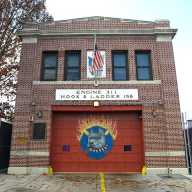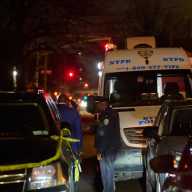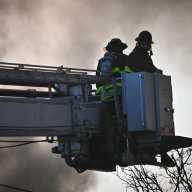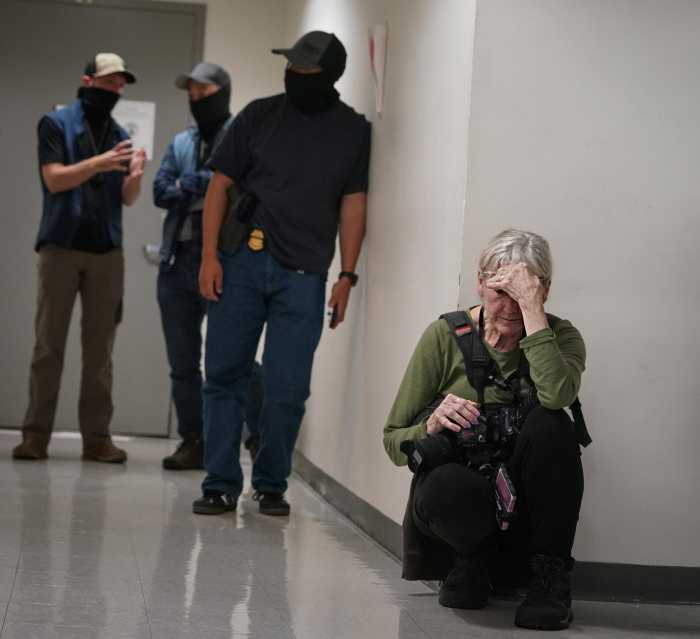Meet pint-sized commuters Zenab, Habeba, and Salma Youssef who no longer have a ride to and from school.
Kindergartener Salma, 5, and first-grader Habeba, 6, have been given MetroCards to take public transit the 4.11 miles from their Astoria apartment to school in Woodside under the city’s school bus re-routing program. However, 8-year-old Zenab, the oldest of the sisters, was not even offered a free MetroCard when their busing stopped on Monday, January 29.
“They are crazy if they think a kindergartener can take the bus or train,” said their frazzled father, Ahmed Youssef. “They are very little to take the bus by themselves.”
Ahmed, who is scheduled to get spinal fusion back surgery next month, has called on friends and neighbors to transport the girls back and forth to the Razi School on Queens Boulevard each day. Because he suffers from crippling back pain, the disabled dad finds it tough to sit and stand for long periods to travel with them.
“I’ve called a different friend every day for the last five days,” Ahmed said. “I’m running out of friends.”
He knew that eventually he would have to put the three girls on the bus and/or train, so on Wednesday, February 7, he decided to make a trial trip with the girls to school. According to the MTA, the quickest route is to take the Q19A bus to Queensboro Plaza, then jump on the No. 7 line subway - there is a way to take a single bus, but the stops are a much longer distance from both their school and home.
After waking at 6 a.m., the family was finally ready to leave at 7, when they headed for the bus stop on 21st Street and 25th Road. At 7:50, the packed bus, which is scheduled to pick up at 7:26, arrived, and by 8:15, the family had given up getting to school on time - class starts at 8 a.m. They hopped in a $7 cab to make sure that the girls did not miss a scheduled class trip.
“They can’t do this. They would lose the cards. They would never figure out how to do the transfer,” Ahmed said after arriving at the Razi School, just as several other parents got there to drop off their children. Another mother, who lives in the same building as the Youssef family, had also found makeshift transportation for her five-year-old daughter and arrived late.
“What better reason could there be to create a [school bus] stop than four little girls in one building?” Ahmed wondered.
Razi Principal Dr. Ghassan Elcheikhali estimated that 120 children of the school’s 470 students received MetroCards instead of the service of a yellow school bus when route changes went into effect last month.
“At 10 o’clock the children feel like they want to go to sleep because they have to wake up at 5, 6 o’clock in the morning to get to school on time,” Elcheikhali said, pleading for politicians to put pressure on the city’s Department of Education (DOE) to revamp the new routes.
Elected officials have blasted the timing of the cuts during the middle of winter and the employment of consulting firm Alvarez & Marsal for $16M, which suggested the school bus cuts as a method to save an estimated $20 million per annum.
Because extra emergency buses have been needed at a cost of $17,500 daily, and because the route changes are going into effect at mid-year, the actual saving amount has dropped to $5 million for the remainder of the school year. Officials hope that the cuts will slash $12 million annually henceforth.
Senator John Sabini, who is collecting signatures for a letter to the DOE bashing the cuts, said that he believes many parents have simply given up and made other arrangements to get their children to and from school.
Astoria dad Spiro Tsouklidis has missed several appointments for his job as a contractor to pick up his daughter, Dia, who is in fourth grade at Transfiguration of Christ Greek Orthodox School in Corona.
Varsity school bus driver Aorel Anka complained that with the new routes drivers are scheduled to travel long distances in short time spans in order to fill the seats.
“It’s really a hassle,” Anka said. “If you have a child on the bus, you have to be extra careful.”































